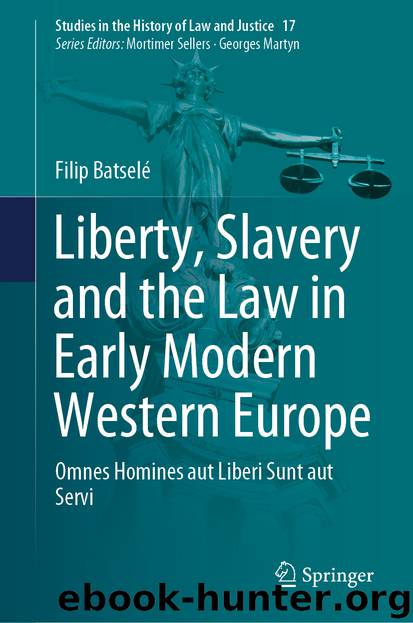Liberty, Slavery and the Law in Early Modern Western Europe by Filip Batselé

Author:Filip Batselé
Language: eng
Format: epub
ISBN: 9783030368555
Publisher: Springer International Publishing
4.2.2.3 The Era of Yorke-Talbot: The Nadir of the English Freedom Principle
In the early 1720s, the Privy Council adopted the previously discussed theory of “conquered” versus “discovered” colonies, which, according to Van Cleve, meant that Holt’s decisions might render slavery unlawful in those colonies which were governed by English common law. These were primarily the discovered colonies, but also those conquered colonies which would have received the relevant part of the common law by royal assent.29
The legal uncertainty thus created was not beneficial for slave-owners. Historiography believed for a long time that this is why slave-owners went to Sir Philip Yorke (1690–1764), at that time the attorney-general, and Sir Charles Talbot (1685–1737), the solicitor-general, to find a listening ear for their grievances.30 The two of them drafted (“upon a petition in Lincoln’s Inn Hall, after dinner”, according to Lord Mansfield31) the infamous Yorke-Talbot opinion on the status of slavery in England. In that opinion, Yorke and Talbot determined four points: (1) A slave coming from the West Indies, with or without his master, did not become free by arriving in England; (2) the master’s property or right in the slave was not at all varied or determined by this arrival; (3) baptising the slave did not change his legal status; and (4) masters could compel their slaves to return together with them to the colonies.32 Although this statement could, technically, not overrule judgments by common law courts, the position of these legal heavyweights led contemporaries to conclude that the opinion had little less authority than settled law.33 More recent historiography has partially revised this understanding of the Yorke-Talbot opinion. In a recent article, Travis Glasson has convincingly argued that the opinion was primarily solicited by Anglican missionaries seeking the means to allow for easier conversion of the slaves to Christianity (given that the idea that “baptism bestows freedom” had been present in English thought for a long time). The slave owners only started using this opinion afterwards, when they found out the potential benefits it offered them.34 In any case, given the benefits to slaveholders, they were quick to try and ensure that the opinion became well known.35
Things did not end there. A 1732 Act of Parliament (“For the more easy Recovery of Debts in his Majesty’s Plantations and Colonies in America”) gave rich Englishmen with an interest in the slave trade even more reason for joy. This act, made in the wake of an economic slump in the colonies (and the accompanying defaults), allowed English merchants to prove their debts and obtain judgments against colonial debtors in English courts. More importantly, for the purpose of settling debts, slaves were to be treated as personal property.36
The Yorke-Talbot opinion would only become more important in the ensuing years, as Talbot became Lord Chancellor in 1733, and Yorke (now known as Lord Hardwicke) became Chief Justice of the King’s Bench. Upon Talbot’s passing in 1737, Hardwicke succeeded him as Lord Chancellor. Whilst in this position, Hardwicke got the opportunity to give his opinion sound footing in law (or more exactly, equity37) in the case of Pearne v.
Download
This site does not store any files on its server. We only index and link to content provided by other sites. Please contact the content providers to delete copyright contents if any and email us, we'll remove relevant links or contents immediately.
2010-The City & the City by China Miéville(1993)
Anatomy of Injustice by Raymond Bonner(1670)
That Every Man Be Armed by Stephen P. Halbrook(1583)
ADHD on Trial by Michael Gordon(1579)
Injustices by Ian Millhiser(1502)
You Don't Own Me by Orly Lobel(1450)
Tell by Major Margaret Witt(1446)
Course Correction by Ginny Gilder(1413)
Broken Scales by Joel Cohen(1354)
Without Copyrights by Spoo Robert(1352)
A Vast Conspiracy by Jeffrey Toobin(1333)
First by Evan Thomas(1291)
J by Howard Jacobson(1263)
A Religious Orgy in Tennessee by H.L. Mencken(1260)
The Run of His Life: The People v. O. J. Simpson by Jeffrey Toobin(1216)
A Triumph of Genius: Edwin Land, Polaroid, and the Kodak Patent War by Ronald K. Fierstein(1206)
A History Of Thailand by Baker Chris(1198)
John Wayne Gacy by Judge Sam Amirante(1115)
Law 101: Everything You Need to Know About American Law, Fourth Edition by Jay Feinman(1105)
